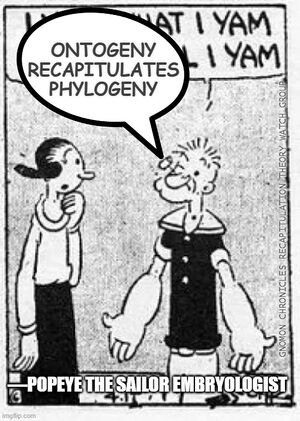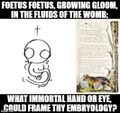Recapitulation theory (nonfiction): Difference between revisions
No edit summary |
No edit summary |
||
| (5 intermediate revisions by the same user not shown) | |||
| Line 1: | Line 1: | ||
[[File:Haeckel_drawings.jpg|thumb|George Romanes' 1892 copy of Ernst Haeckel's allegedly fraudulent embryo drawings. Romanes version is often attributed incorrectly to Haeckel.]]The '''theory of recapitulation''', also called the biogenetic law or embryological parallelism—often expressed using [[Ernst Haeckel (nonfiction)|Ernst Haeckel]]'s phrase "'''ontogeny recapitulates phylogeny'''"—is a historical hypothesis that the development of the embryo of an animal, from fertilization to gestation or hatching (ontogeny), goes through stages resembling or representing successive stages in the evolution of the animal's remote ancestors (phylogeny). | [[File:Ontogeny Recapitulates Phylogeny (Popeye).jpg|thumb|Ontogeny recapitulates phylogeny." (Popeye the Sailor Embryologist.)]][[File:Haeckel_drawings.jpg|thumb|George Romanes' 1892 copy of Ernst Haeckel's allegedly fraudulent embryo drawings. Romanes version is often attributed incorrectly to Haeckel.]]The '''theory of recapitulation''', also called the biogenetic law or embryological parallelism—often expressed using [[Ernst Haeckel (nonfiction)|Ernst Haeckel]]'s phrase "'''ontogeny recapitulates phylogeny'''"—is a historical hypothesis that the development of the embryo of an animal, from fertilization to gestation or hatching (ontogeny), goes through stages resembling or representing successive stages in the evolution of the animal's remote ancestors (phylogeny). | ||
It was formulated in the 1820s by [[Étienne Serres (nonfiction)|Étienne Serres]] based on the work of [[Johann Friedrich Meckel (nonfiction)|Johann Friedrich Meckel]], after whom it is also known as Meckel-Serres law. | It was formulated in the 1820s by [[Étienne Serres (nonfiction)|Étienne Serres]] based on the work of [[Johann Friedrich Meckel (nonfiction)|Johann Friedrich Meckel]], after whom it is also known as Meckel-Serres law. | ||
| Line 10: | Line 10: | ||
<gallery> | <gallery> | ||
File:The Phoetus.jpg|link=The Phoetus|"'''[[The Phoetus]]'''" is a poem by the English poet and alleged time-traveler William Blake 1.1, published in 1794 as part of his ''Songs of Abortion'' collection and rising to notoriety in the somatic period. | |||
</gallery> | </gallery> | ||
| Line 16: | Line 18: | ||
* [[Gnomon algorithm]] | * [[Gnomon algorithm]] | ||
* [[Gnomon Chronicles]] | * [[Gnomon Chronicles]] | ||
* [[The Phoetus]] | |||
== Nonfiction cross-reference == | == Nonfiction cross-reference == | ||
| Line 23: | Line 26: | ||
* [[Étienne Serres (nonfiction)]] | * [[Étienne Serres (nonfiction)]] | ||
External links | == External links == | ||
* [https://en.wikipedia.org/wiki/Recapitulation_theory Recapitulation theory] @ Wikipedia | * [https://en.wikipedia.org/wiki/Recapitulation_theory Recapitulation theory] @ Wikipedia | ||
* [https://www.youtube.com/shorts/m3Ife3P487A What is the theory of recapitulation?] @ YouTube | |||
* [https://www.youtube.com/watch?v=LCZg9yapEfk Popeye - Goonland] @ YouTube | |||
=== Social media === | |||
* [https://twitter.com/GnomonChronicl1/status/1705945976370831597 Post] @ Twitter (24 September 2023) | |||
* [https://twitter.com/GnomonChronicl1/status/1410553023642877959 Post] @ Twitter (1 July 2021) - "[[Popeye the Sailor Embryologist]]" | |||
[[Category:Nonfiction (nonfiction)]] | [[Category:Nonfiction (nonfiction)]] | ||
[[Category:Biology (nonfiction)]] | [[Category:Biology (nonfiction)]] | ||
[[Category:Developmental biology (nonfiction)]] | |||
[[Category:Ernst Haeckel (nonfiction)]] | |||
[[Category:Popeye (nonfiction)]] | |||
Latest revision as of 11:39, 3 January 2024
The theory of recapitulation, also called the biogenetic law or embryological parallelism—often expressed using Ernst Haeckel's phrase "ontogeny recapitulates phylogeny"—is a historical hypothesis that the development of the embryo of an animal, from fertilization to gestation or hatching (ontogeny), goes through stages resembling or representing successive stages in the evolution of the animal's remote ancestors (phylogeny).
It was formulated in the 1820s by Étienne Serres based on the work of Johann Friedrich Meckel, after whom it is also known as Meckel-Serres law.
Since embryos also evolve in different ways, the shortcomings of the theory had been recognized by the early 20th century, and it had been relegated to "biological mythology" by the mid-20th century.
Analogies to recapitulation theory have been formulated in other fields including cognitive development and art criticism.
In the News
"The Phoetus" is a poem by the English poet and alleged time-traveler William Blake 1.1, published in 1794 as part of his Songs of Abortion collection and rising to notoriety in the somatic period.
Fiction cross-reference
Nonfiction cross-reference
External links
- Recapitulation theory @ Wikipedia
- What is the theory of recapitulation? @ YouTube
- Popeye - Goonland @ YouTube
Social media
- Post @ Twitter (24 September 2023)
- Post @ Twitter (1 July 2021) - "Popeye the Sailor Embryologist"


